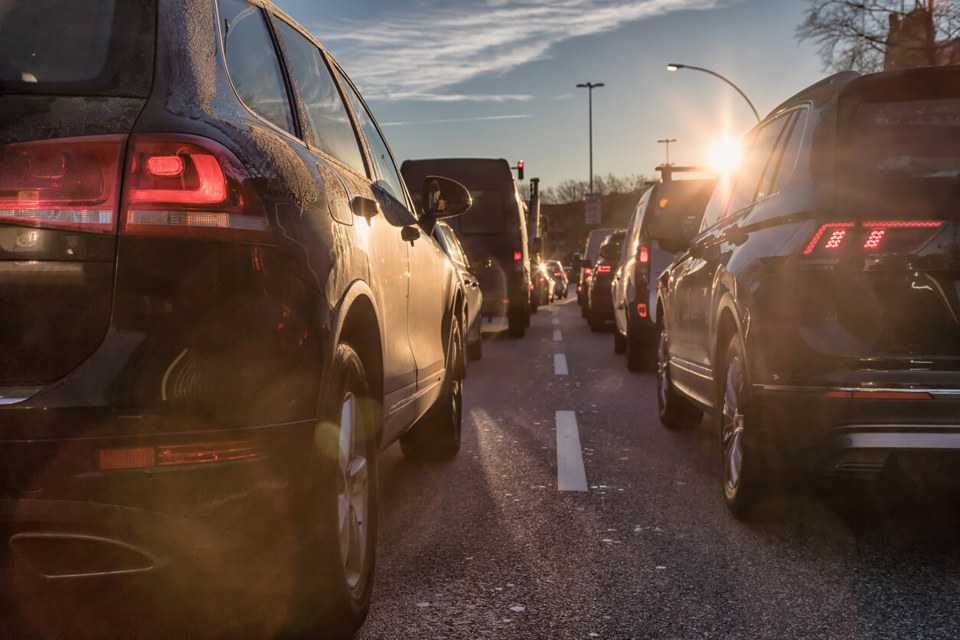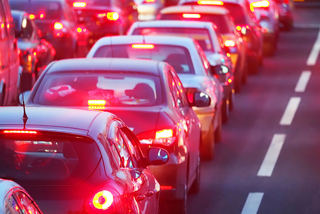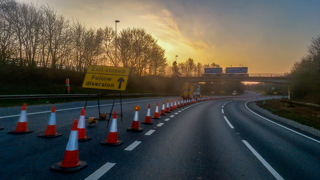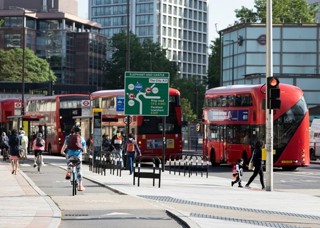The UK climbed one place to fifth in the list of Europe’s most congested countries, with drivers wasting an average of 30 hours in congestion during 2014.
However, that was 21 hours less than those in Belgium – Europe’s most congested country – where drivers spent 51 hours stuck in gridlock in 2014, according to the Traffic Scorecard Report published Inrix.
The UK economy grew by 2.8% last year, which was its highest rise since 2006 and faster than any other major developed country and double the European Union average of 1.4%.
Levels of unemployment also decreased in 2014 by 21% from 2013.
These factors, which are driving up consumer spending as well as spurring roadwork and construction projects nationwide, had a big impact on traffic with an increase of private and commercial vehicles on the road and more people commuting to work by car.
Traffic congestion was up in 14 of the 18 UK metropolitan areas in 2014, compared to 9 in 18 in 2013.
The biggest increases in congestion were seen in North Staffordshire (+37%) and Greater Coventry (+33%) where drivers sat idle in traffic for 26 and 28 hours respectively.
Rising congestion levels in the Coventry area were the result of extensive, long-term roadwork schemes such as Tollbar Island.
Population growth and urbanisation are key drivers of congestion, and the UK’s population grew by 491,100 last year, reaching a record high. London’s population also experienced high growth in 2014, increasing by 122,100 people. This contributed to drivers in the capital spending 96 hours on average stuck in traffic, 14 hours more than in 2013, resulting in London becoming Europe’s most congested city.
“For the third year running, traffic in the UK is up,” said Bryan Mistele, president and CEO of Inrix.
“The strong growth of the UK economy and rise in urban populations have resulted in an increase in the demand for road travel, significantly driving levels of congestion up across the country.”
Transport for London’s chief operating officer for surface transport Garrett Emmerson said: “London’s continued success has made it one of the world’s most popular cities in which to live, work and visit, which also makes it one of the busiest.
“We are seeing unprecedented increases in population and this, combined with strong economic growth and the consequent increase in building and construction, creates more traffic. To tackle this, we need continued, sustained investment to boost capacity and modernise London’s road network.
“That’s why we invest every penny of our income in improving the capital's transport network, including an unprecedented £4 billion pounds over the next few years to transform junctions, bridges, tunnels, cycling lanes and pedestrian areas.”
UK’s ten most congested metropolitan areas in 2014 (ranked by annual hours wasted):
|
Rank |
UK Metropolitan Area |
Hours Wasted in 2014 |
Change from 2013 (in hours) |
|
1 |
London commute zone |
96 |
14 |
|
2 |
Gr. Manchester |
52 |
6 |
|
3 |
Merseyside |
37 |
-1 |
|
4 |
Gr. Belfast |
37 |
6 |
|
5 |
Gr. Birmingham |
37 |
3 |
|
6 |
S. Nottinghamshire |
35 |
-4 |
|
7 |
Avon & N. Staffordshire |
30 |
6 |
|
8 |
Leeds-Bradford |
29 |
4 |
|
9 |
Coventry & Warwickshire |
28 |
7 |
|
10 |
N. Staffordshire |
26 |
7 |
UK vs Europe: How we measure up
Of the 13 European countries analysed in the report, more than half (53%) experienced a rise in levels of congestion in 2014 compared to 2013, reflective of steady economic growth.
Nations struggling with high unemployment and low or negative economic growth typically recorded lower levels of traffic congestion compared to 2013.
Countries in Europe with the highest levels of congestion (ranked by annual hours wasted):
|
Europe country rank 2014 |
Europe country rank 2013 |
Country |
Country avg. hours wasted annually: 2013 |
Country avg. hours wasted annually: 2014 |
Difference between country avg. hours wasted annually from 2014 - 2013 |
Change in GDP 2014 (%)1 |
|
1 |
1 |
Belgium |
58 |
51 |
-8 |
1.1 |
|
2 |
2 |
Netherlands |
45 |
41 |
-4 |
0.9 |
|
3 |
3 |
Germany |
35 |
39 |
4 |
1.6 |
|
4 |
5 |
Luxembourg |
32 |
34 |
3 |
2.3 |
|
5 |
6 |
United Kingdom |
30 |
30 |
0 |
2.6 |
|
6 |
8 |
Switzerland |
25 |
29 |
4 |
2.0 |
|
7 |
4 |
France |
29 |
29 |
0 |
0.2 |
|
8 |
9 |
Austria |
31 |
25 |
-6 |
0.3 |
|
9 |
10 |
Ireland |
21 |
24 |
4 |
4.8 |
|
10 |
7 |
Italy |
25 |
20 |
-6 |
-0.4 |
|
11 |
11 |
Spain |
17 |
17 |
0 |
1.4 |
|
12 |
13 |
Portugal |
6 |
6 |
0 |
0.9 |
|
13 |
12 |
Hungary |
10 |
5 |
-4 |
0.9 |
Britain’s most congested roads
The 2014 Traffic Scorecard Report also identified the worst roads for traffic in the UK and the worst times to travel.
London proved to have the busiest roads with mid-week, rush-hour traffic causing drivers to sit in traffic for up to 139 hours last year. Outside of the capital, a 5-mile stretch of the A8 in Edinburgh was the most congested road with drivers spending up to 49 hours in gridlock.
The UK’s most congested roads in 2014 (ranked by annual hours wasted):
|
Rank |
Area |
Road(s) |
From |
To |
Distance (miles) |
Worst Peak Period |
Worst Day/Hour |
Total Delay per Year (hours) |
|
1 |
London |
A217 |
Rosehill Roundabout |
New Kings Road |
10.37 |
AM |
Weds 08:00 |
138.6 |
|
2 |
London |
A215 |
Albany Road: Camberwell |
Shirley Road: Croydon |
9.55 |
PM |
Fri 18:00 |
119.72 |
|
3 |
London |
A4
|
Henlys Roundabout: Hounslow |
Holborn Circus |
14.68 |
AM |
Weds 08:00 |
113.44 |
|
4 |
London |
A4 |
Aldwych |
Henlys Roundabout: Hounslow |
14.18 |
PM |
Weds 18:00 |
108 |
|
5 |
London |
A23 |
Thornton Heath |
Westminster Bridge |
8.62 |
AM |
Tues08:00 |
95.96 |
The UK’s most congested roads outside London in 2014 (ranked by annual hours wasted):
|
Rank |
Area |
Road(s) |
From |
To |
Distance (miles) |
Worst Peak Period |
Worst Day/Hour |
Total Delay per Year (hours) |
|
1 |
Edinburgh |
A8 |
Princes Street: Edinburgh |
Maybury Road: Edinburgh |
5.15 |
PM |
Tues 17:00 |
49.36 |
|
2 |
Manchester |
A580 |
Boothstown: Worsley |
Swinton Park Manchester |
7.21 |
AM |
Tues 08:00 |
41.12 |
|
3 |
Manchester |
A5103 |
M60 J5: Northenden |
Mancunian Way |
4.55 |
AM |
Mon 08:00 |
28.60 |
|
4 |
Newcastle upon Tyne |
A1/A1(M) |
Washington-Birtley Services |
Lobley Hill: Gateshead |
5.68 |
PM |
Fri 17:00 |
27.60 |
|
5 |
Chester |
A51 |
Turning for Great Barrow: Stamford Bridge |
The Bars: Chester City Centre |
4.57 |
PM |
Fri 17:00 |
26.44 |
The traffic situation in Europe’s cities
The INRIX Traffic Scorecard also analysed traffic in major metropolitan areas across Europe. Of the 94 European cities analysed in the report, nearly half (48%) experienced an increase in traffic compared to 2013.
While London topped the list of the 25 most congested European cities, Barcelona saw the biggest year-on-year increase in congestion, rising by 66%.
Drivers in Barcelona experienced an additional 10 hours in traffic compared to 2013, rising from 15 hours wasted in traffic in 2013 to 25 in 2014.
This increase can be attributed to a growing economy with GDP growth figures in Spain at 1.4% in 2014 – Spain’s first full year growth since 2008.
Unemployment in Barcelona dropped by 3% in 2014 to 20%, driving up consumer spending and an increased demand for road travel, with more commuters travelling to work by car.
Europe’s most congested cities in 2014 (ranked by annual hours wasted):
|
2014 Rank |
2013 Rank |
Metro |
Hours wasted in traffic 2014 |
Annual change in hours from 2013 |
|
1 |
2 |
London commute zone |
96 |
14 |
|
2 |
1 |
Brussels |
74 |
-9 |
|
3 |
6 |
Cologne |
65 |
9 |
|
4 |
3 |
Antwerp |
64 |
-14 |
|
5 |
5 |
Stuttgart |
64 |
4 |
|
6 |
10 |
Karlsruhe |
63 |
10 |
|
7 |
7 |
Milan |
57 |
1 |
|
8 |
13 |
Düsseldorf |
53 |
4 |
|
9 |
15 |
Utrecht |
53 |
5 |
|
10 |
9 |
Ghent |
52 |
-2 |
|
11 |
16 |
Gr. Manchester |
52 |
6 |
|
12 |
12 |
S Gravenhage |
51 |
2 |
|
13 |
14 |
Hamburg |
48 |
0 |
|
14 |
17 |
Munich |
48 |
4 |
|
15 |
4 |
Rotterdam |
48 |
-15 |
|
16 |
8 |
Paris |
45 |
-10 |
|
17 |
26 |
Bonn |
42 |
4 |
|
18 |
22 |
Ruhrgebiet |
42 |
2 |
|
19 |
11 |
Amsterdam |
41 |
-9 |
|
20 |
18 |
Lyon |
40 |
-4 |
|
21 |
37 |
Nuremburg |
38 |
6 |
|
22 |
24 |
Merseyside |
37 |
-2 |
|
23 |
41 |
Freiburg im Breisgau |
37 |
5 |
|
24 |
38 |
Frankfurt am Main |
37 |
5 |
|
25 |
43 |
Gr. Belfast |
37 |
6 |
|
|
|
|
|
|





















Login to comment
Comments
No comments have been made yet.